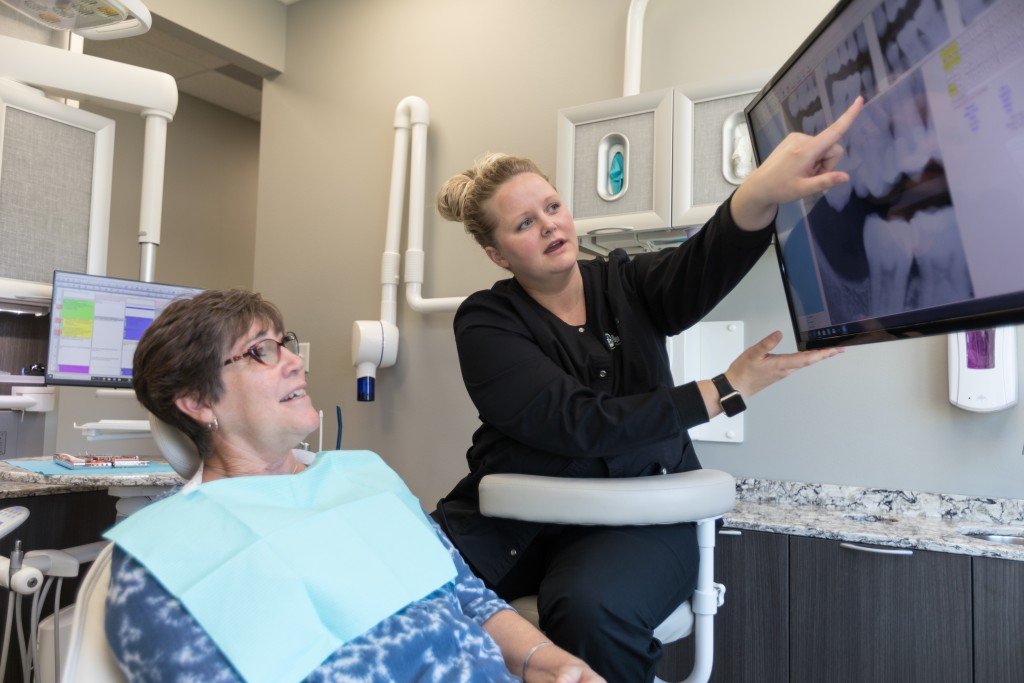
Did you know that poor dental health can not only lead to a toothless smile, but to a number of other issues as well? Your oral health can offer clues to underlying health issues like diabetes, HIV/AIDS, or a number of other conditions. While it’s hard to believe that problems occurring in your mouth actually affect the rest of your body to that extent, they do. That’s why we are here to give you some information on how oral health contributes to your overall health.
Bacteria vs. Your Mouth
Your mouth is the main entry point to your digestive system and respiratory tract. Anything you put into your mouth can carry in bacteria and while some of it is harmless, some kinds are not so harmless. These bad bacterial species can cause different diseases and lead to numerous resulting health problems.
With good oral hygiene (twice a day brushing for two minutes and daily flossing) in combination with your body’s natural defense mechanisms, you can keep bacteria under control. However, if you have poor oral hygiene, bacteria can grow and multiply to levels that cause issues such as tooth decay or gum disease.
When these bacteria progress further and start to cause more serious damage, they can start to play a bigger role in negatively affecting your health, as you will see below.
Diabetes and Oral Health
It is a known fact that people with diabetes are more prone to gum disease. However, newer studies suggest that serious gum disease may directly contribute to diabetes since it affects blood glucose control. Some possible dental indicators of diabetes to look out for are:
- Dry Mouth
- Increased Tooth Decay
- Oral Thrush or Fungal Infection
- Periodontal Disease
Recent data even suggests that the periodontal bacteria in your mouth can actually increase insulin resistance and, therefore, blood glucose levels. If diabetes runs in your family, or if you have any concerns about the symptoms, speak with your dentist.
Cardiovascular Disease and Oral Health
Gum disease (gingivitis or periodontitis) from chronic bacterial exposure can increase inflammation levels throughout the body. Inflammation is a major risk factor for heart disease, as it has been directly associated with an increased risk of heart disease, heart attack, and stroke. Bacteria from plaque can even enter the bloodstream and contribute to narrowing of the artery walls (atherosclerosis).
Pneumonia and Oral Health
Due to the fact that people with periodontal disease have more bacteria accumulating in their mouths, they are also more susceptible to germs that can lead to lung infections like pneumonia. And if you already experience a pre-existing lung problem like chronic obstructive pulmonary disease (COPD), gum disease may make it worse.
Pregnancy and Oral Health
When you are expecting, there are a number of different things you must be aware of and do to make sure your baby is born healthy. One thing people may not think about, however, is their oral hygiene. Studies have shown that pregnant women who have progressive gum disease may be more likely to develop gestational diabetes, deliver pre-term, or have their baby born with a low birth weight.
This is why maintaining regular checkups with your dentist during pregnancy is so important. Babies who are born pre-term or with a low birth weight often have a higher risk of complications, including birth abnormalities, developmental problems, asthma, frequent ear infections, behavioral difficulties, and even a higher risk of infant death.
If you are pregnant, make it a priority to visit your dentist for regular checkups, and make sure you take extra good care of your teeth at home!
HIV/AIDS and Oral Health
When it comes to oral health and HIV/AIDS, here are a few indicators to look out for:
- Frequent Canker Sores
- Frequent Cold Sores
- Painful Mucosal Lesions
- Oral Thrush / Fungal Infection
- New or Worsened Periodontal Disease
- Increased Tooth Decay
Having any of these symptoms does not necessarily mean you have HIV/AIDS, but if you experience more than one regularly or have had a recent change in symptoms, then you may want to speak with your dentist about your concerns.
Protect Your Oral Health
When it comes to maintaining good oral health, it is very important to take the time to get a thorough cleaning in. So, here are some helpful tips to practice on your own:
Brush Your Teeth Twice A Day
When you are brushing your teeth, try to brush once in the morning, and once in the evening before you go to bed. Over time, your toothbrush bristles wear out, so make sure you are replacing your toothbrush every 3 months. Also, don’t forget to brush your tongue! Germs get trapped on your tongue throughout the day, can lead to bad breath, and impact your sense of taste. In severe cases, overgrown bacteria that collects on your tongue can turn your tongue different colors and even make it look hairy.
Floss Daily
Flossing might not be the most fun, but it is highly important to get those hard to reach areas between your teeth that your toothbrush misses. And don’t be scared off by a little tenderness or bleeding at first! Regular daily flossing for two weeks should clear up any discomfort or bleeding when flossing, so hang in there.
Smoking is bad for your teeth for a number of reasons. Not only will it stain your teeth, but it causes bad breath and slows down the rate of healing in your mouth, which often leads to more severe forms of gum disease. With alcohol, many mixed drinks are jam-packed with sugar, which increases your risk for cavities. To avoid cavities and keep your pearly whites healthy, try limiting or avoiding sugary foods and drinks.
As always, the team at Uptown Dental is happy to answer your questions and put you on the right track toward excellent dental health. Contact us today to speak with your staff and schedule an appointment!
